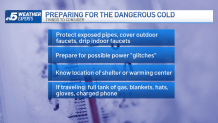The operator of the Texas power grid expects to have enough power supplies to meet electricity demand as a surge of Arctic air plunges the state into freezing temperatures next week.
The Electric Reliability Council of Texas said Friday that it is monitoring weather forecasts and "expects sufficient generation to meet forecasted demand."
ERCOT said it notified utility and power plant owners that temperatures will be 25 degrees or lower in the Dallas-Fort Worth, Austin and San Antonio metro areas between Thursday, Dec. 22 to Monday, Dec. 26.
It said reforms to weatherize the power grid since the deadly 2021 winter storm have "strengthened significantly" the reliability and resiliency.
Get top local stories in DFW delivered to you every morning. Sign up for NBC DFW's News Headlines newsletter.
"Providing Texans with a reliable electric grid is our highest priority. As we monitor weather conditions, we want to assure Texans that the grid is resilient and reliable," Pablo Vegas, ERCOT president and CEO, stated in a news release. "We will keep the public informed as weather conditions change throughout the coming week."
HOW COLD WILL IT GET?
A strong cold front will arrive on Thursday, bringing the coldest temperatures of the season so far. Howling north winds will accompany the front, adding to the chill.
Local
The latest news from around North Texas.
Temperatures will plummet into the teens and 20s region-wide by next Thursday night. High temperatures will struggle to climb out of the 30s. Gusts upwards of 40-45 mph will be possible.
The coldest temperatures look to arrive early Friday morning with many locations tumbling into the teens. With gusty winds, the feels like temperatures Friday morning will be sub-zero.
NBC 5 Meteorologist Kevan Smith says that while it could be the coldest Christmas Day recorded in DFW since 2009, the chance for any snow around the holiday remains unlikely.
TEXAS WINTERIZING TIPS
Winterizing Your Home
Before the cold, replace worn weatherstripping on doors and windows to ensure there is a good seal. This will make sure warm air stays inside and cold air stays outside. Most modern windows are sealed inside the frame, but older windows may be sealed with a glaze that can crack and need replacing. The glaze may need to be applied above a certain temperature and it'll need time to cure -- this maintenance is ideally done in the spring or fall. Lastly, check your gutters to make sure they are clear and allow for water to flow freely to the downspout. Blocked gutters can lead to water entering the home. The Texas Department of Insurance also recommends trimming trees away from power lines, homes, and cars and checking the insulation level in attics.
Protecting Your Pipes
Most North Texans know to insulate their outdoor faucets, but if the cold snap is prolonged it could be a good idea to also leave inside faucets on external walls dripping overnight so that they don't freeze. The drip, drip, drip from running faucets, if heard, can be annoying, so put a sponge or towel in the sink to silently catch each drop. If you're leaving town for a few days, the Texas Department of Public Safety recommends leaving cabinet doors open so that pipes on external walls are more exposed to heat. If you have pipes in an attic or crawlspace, are any other exposed pipes outdoors, they'll need insulation. About those external faucets, disconnect hoses and insulate the valves. Wrapping valves with towels is not the best long-term solution. Most if not all North Texas hardware stores sell inexpensive exterior faucet covers made of foam that easily attaches to the faucet bib in just a few seconds and do a great job protecting the pipe from freezing. If you do suspect a pipe has frozen, keep the faucet open so that water can flow when it melts. Additionally, make sure you know where your main water valve is located (and how to turn it off) in the event a pipe bursts.

Bring in Your Pets
Even if you have a pet or animal that normally lives or sleeps outdoors, they could be susceptible to cold, hypothermia and pneumonia. The SPCA of Texas says if you'd be cold outside, odds are your pet is cold too. Bring pets inside and make sure other outdoor animals have appropriate shelter, dry and well insulated, to protect them from frigid temperatures and possible death.
Turn Off Your Sprinkler System
You want to turn off your irrigation system for a number of reasons. One is that you don't want it running on its normal schedule, potentially throwing water on streets where it can freeze and be dangerous for passing cars. Second, you don't want to risk any broken pipes or valves that may come with a system that has not been winterized. To winterize your system, the city of Fort Worth recommends timers and back-flow devices both be turned off, even if you have freeze or rain sensors installed and that the main line is drained. Any pipes that are above the ground should also be insulated.
Protecting Your Plants
Perennial potted plants should be brought inside and those that cannot be brought inside will need to be covered. There are several products that can be used to help protect delicate plants. For plants left outside, a day or two before a freeze hits, the Dallas Arboretum recommends watering the soil only by hand only, keeping the foliage dry, to insulate the plant's roots. The arboretum also recommends using frost cloth (image below) to trap heat instead of plastic sheeting -- which doesn't prevent condensation.

HVAC
Many air filters should be changed or cleaned every three months, or every season. But that's not the only winterizing needed for your HVAC system. You should have your ductwork checked regularly for holes (whether from vibration or rodents) to make sure the airflow is uninterrupted. If part of your HVAC is in the attic, it may also be home to rats, mice and squirrels who find the warmth of the unit an ideal spot to build a nest.
Swimming Pools
Even if you have a freeze protector among your pool equipment, you'll want to look at the pump every day to make sure it's moving water through your pipes. Those pipes, too, can burst if they freeze. Some pool owners drain their equipment in the offseason to prevent busted pipes.
Batteries
It's always a good idea to on hand a supply of fresh batteries in the event they're needed for flashlights during a power outage. If you didn't replace the batteries in your smoke and carbon monoxide detectors during daylight saving time -- now is a good time to make the switch.
Winter Weather Fast Facts
According to the National Weather Service, in North Texas, from 1898 to 2022, the average date of the first freeze is Nov. 22. The earliest freeze on record is Oct. 22, 1898, and the latest is a tie for April 13, 1997, and April 13, 1957. From 1991-2020, North Texas averaged 29 freeze days between October and April. Most freeze days occur in January followed by December and February.



